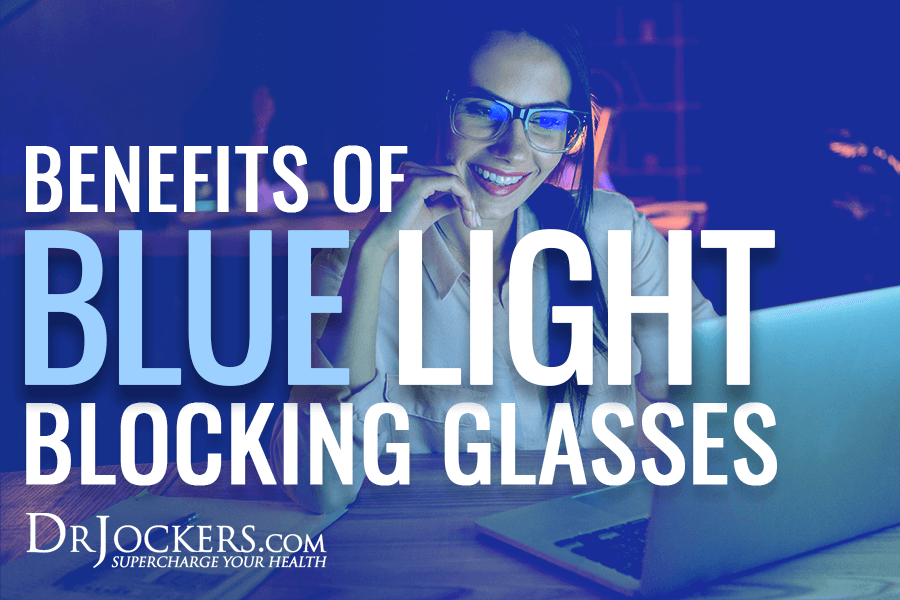 Blue Light Blocking Glasses: Benefits and Top Recommendations
Blue Light Blocking Glasses: Benefits and Top Recommendations
Blue light is one of the colors in the visible light spectrum that’s important for regulating your circadian rhythm. For most of human history, the only source of blue light was the sun. Unfortunately, today, we are exposed to artificial blue lights from TVs, computers, laptops, smartphones, tablets, gaming devices, other electronic devices, and LED and fluorescent lighting.
Being exposed to artificial blue light all the time can disrupt your circadian rhythm, cause sleep issues, and disrupt your health. Fortunately, you can reduce your blue light exposure with the help of some blue light blocking glasses and some simple strategies.
Today I want to discuss the dangers of artificial blue light and the benefits of wearing blue light blocking glasses. You will learn what blue light is. I will discuss the importance of a healthy circadian rhythm. You will understand the symptoms of circadian rhythm disruption. I will offer my top strategies for healthy circadian rhythm. You will learn what blue light blocking glasses are and what are the benefits of wearing blue light blocking glasses.
I will go over some studies on the benefits of blue light blocking glasses for sleep and studies comparing different blue light blocking glasses and my top recommendation for blue light blocking glasses.
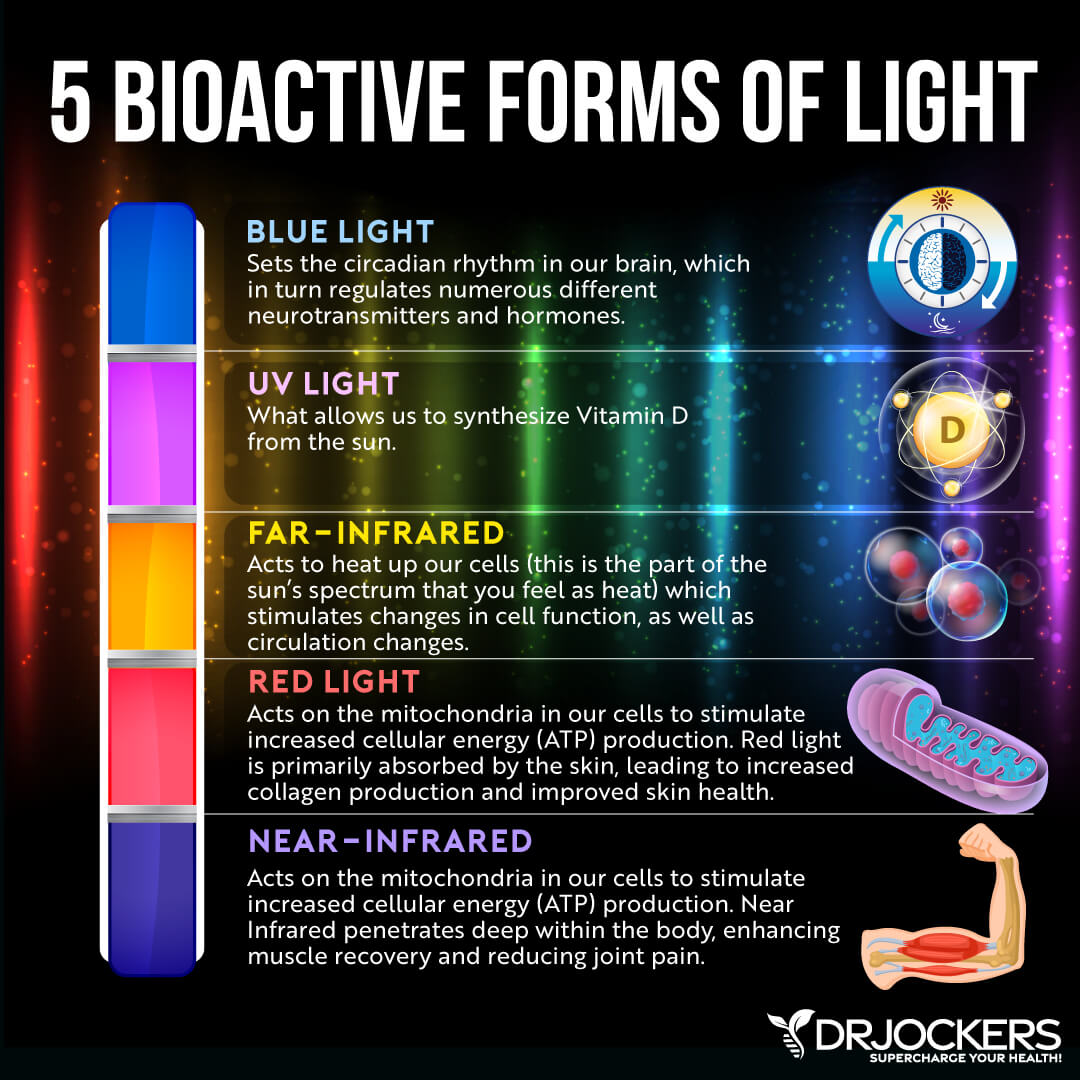
What is Blue Light
Blue light is one of the colors in the visible light spectrum that’s accessible to the human eyes. Other colors include red, yellow, orange, blue, green, violet, and indigo. Blue light has a short wavelength. This means that blue light creates a higher amount of energy than lights with longer wavelengths.
For millions of years, the only source of blue light was the sun. Today, blue light surrounds us. Blue light is coming from your TV, computer, laptop, smartphone, tablet, gaming devices, and other electronic devices. LED and fluorescent lighting are also blue light.
There is a difference between natural blue light and artificial blue light. Natural blue light coming from the sun makes the sky appear blue as the blue wavelengths hit the air molecules. Natural blue light also supports your body’s natural sleep and wake cycle (more on that later). It supports alertness, energy, reaction time, mood, and well-being during the day and helps you sleep at night. Artificial blue light exposure, on the other hand, can interrupt your circadian rhythms and overall health.
Artificial blue light is everywhere. According to a 2020 study published in the Indian Journal of Ophthalmology, about one-third of the population used devices that emit blue light for 9 to 11 hours each day and about 15 percent used them for 12 to 14 hours a day (1). Unfortunately, it can negatively impact your health by causing eyestrain, headaches, sleep problems, and fatigue.
According to a 2019 study published in Cells, blue light can damage the retina (2). According to a 2019 review published in Somnology (Berlin), blue light exposure may interrupt your circadian rhythm (3). According to a 2016 study published in Brain, blue light may worsen symptoms of migraine (4).
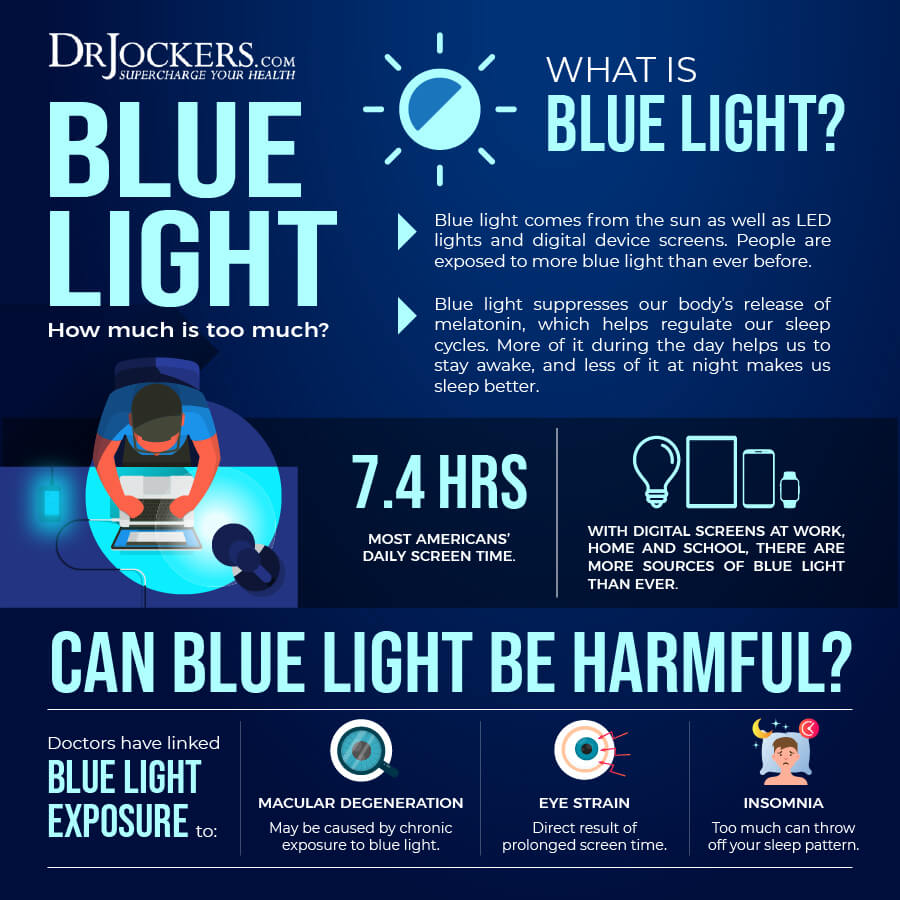
Importance of Healthy Circadian Rhythm
Your circadian rhythm is the 24-hour cycle of your body’s internal clock. It is often referred to as your sleep-wake cycle. A healthy circadian rhythm is crucial for your body’s essential functions and processes.
A healthy circadian rhythm is aligned with your body’s master clock in your brain, which is influenced by light and other environmental clues to give appropriate commands to your body. A healthy circadian rhythm supports consistent restorative sleep at night and energy during the day. It is critical for both your physical and mental health (5).
Your circadian rhythm influences your digestive system by creating certain proteins to match your meal times and regulates hormones that support energy expenditure. It helps to effectively time important bodily processes and regulate your activity during the day (6).
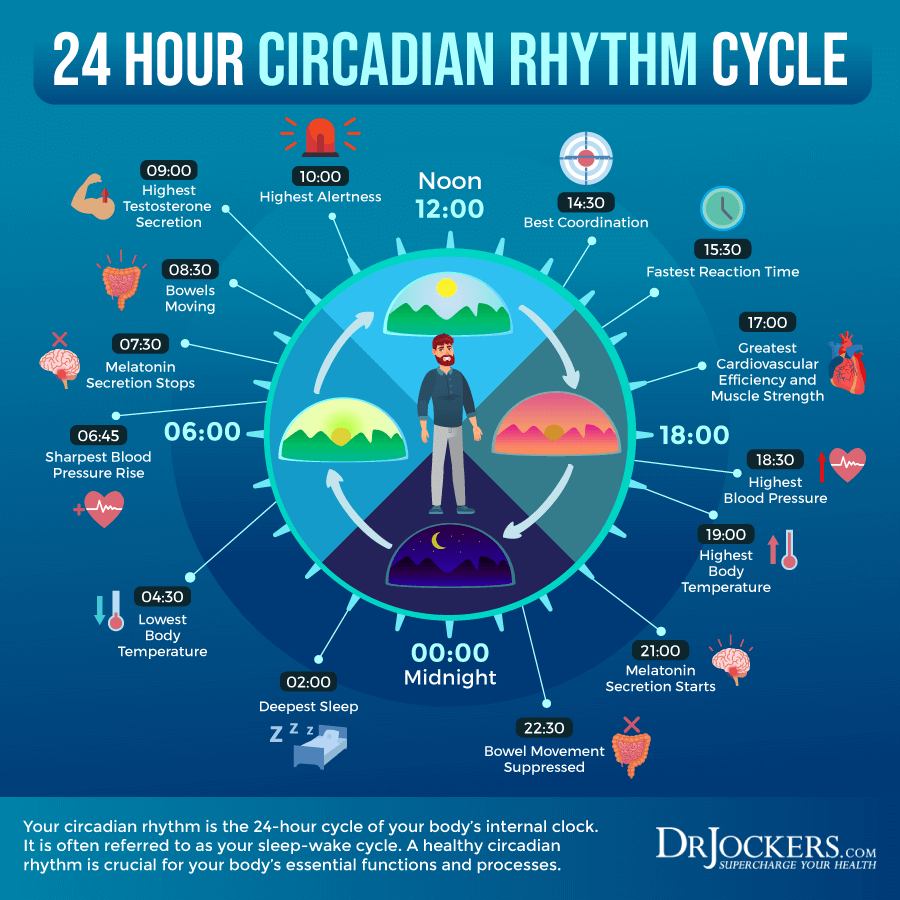
How Does Your Circadian Rhythm Affect Your Sleep?
One of the most important and obvious things your circadian rhythm influences is your sleep. Your circadian rhythm prompts your body to generate wakefulness, alertness, and energy to keep you active during the day. In the evening, your body will start producing melatonin to promote sleep.
A healthy circadian rhythm will align cycles of wakefulness and sleep with daytime and nighttime. By allowing restorative sleep at night, it can support wakefulness and energy throughout the day. A disruption of your circadian rhythm can lead to all kinds of sleep problems, fatigue, and low energy. For example, according to a 2015 study published in Sleep, circadian rhythm problems may play a role in obstructive sleep apnea (7).
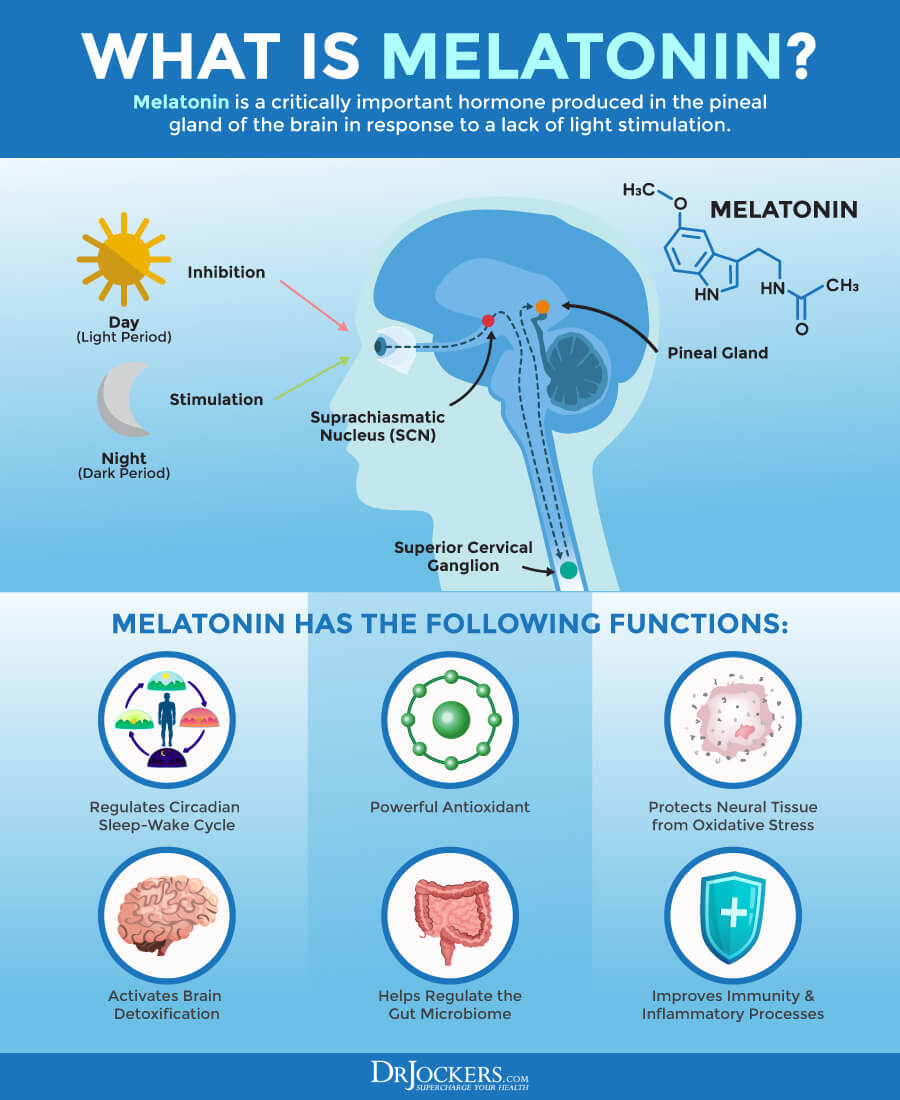
Other Roles of Your Circadian Rhythm
Your circadian rhythm plays a vital role in just about every function of your body. According to a 2017 study published in Human Molecular Genetics, your circadian rhythm plays a role in your metabolism, weight, blood sugar levels, cholesterol, cognition, and mental health (8). A disruption of your circadian rhythm may play a role in mental health issues, such as depression, and neurodegenerative conditions, such as dementia.
According to a 2015 study published in Biochemistry, your circadian rhythm may play an important role in your immune system and DNA repair, thus may play a role in cancer prevention and treatments (9). According to a 2018 study published in Nature, the circadian rhythm may affect the effectiveness of anti-cancer drugs and new medications for cancer may be able to use your circadian cycle for fighting cancer (10).
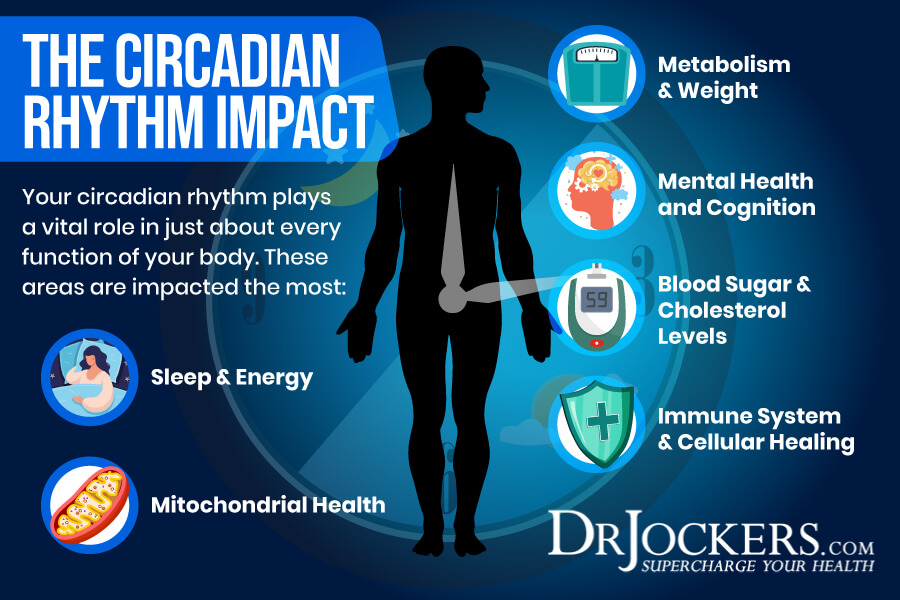
Symptoms of Circadian Rhythm Disruption
Sleep-related symptoms of circadian rhythm disruption may include:
- Difficulty falling asleep
- Difficulty staying asleep
- Nightmares or night terrors
- Waking up too early and struggling to fall back asleep
Other symptoms of circadian rhythm disruption may include:
- Fatigue during the day
- Feeling energetic in the evening or at night
- Feeling alert, productive, or creative at night
- Feeling tired, unmotivated, or lazy in the morning or during the day
- Changes in appetite
- Gastrointestinal symptoms
- Decreased sex drive
- Moodiness and irritability
- Ongoing fatigue
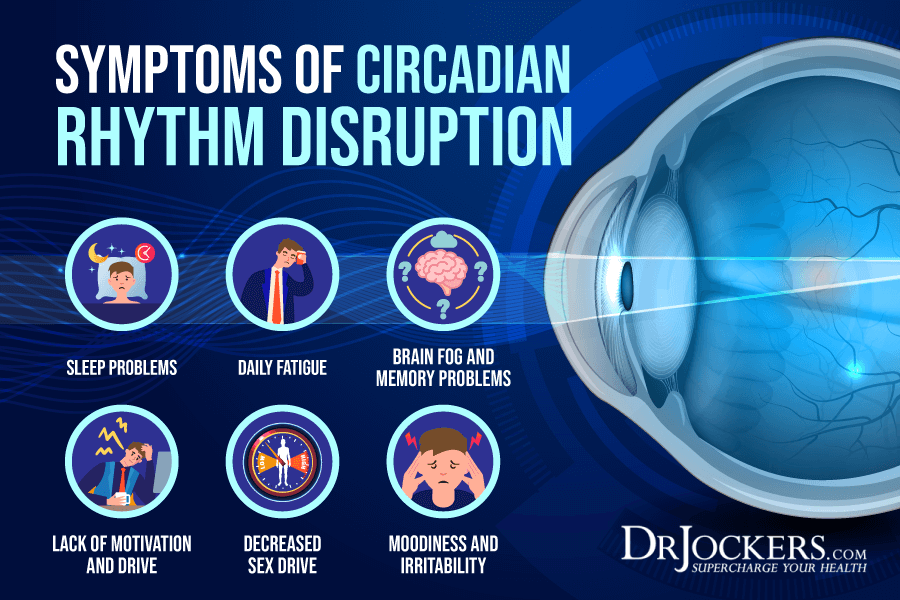
Common Triggers of Circadian Rhythm Disruption
Common triggers and risk factors for circadian disruption may include:
- Jet lag
- Poor sleep hygiene
- Frequent change in work shift or working 3rd shift
- Frequent changes in bedtime and wake-up time
- Poor sleep hygiene
- Brain damage from dementia, stroke, head injury, etc
- Blindness or lack of exposure to light for other reasons
- Certain medications
- Older age
- Consuming sugar, heavy foods, caffeine, or alcohol in the evening or at night
- Chronic stress
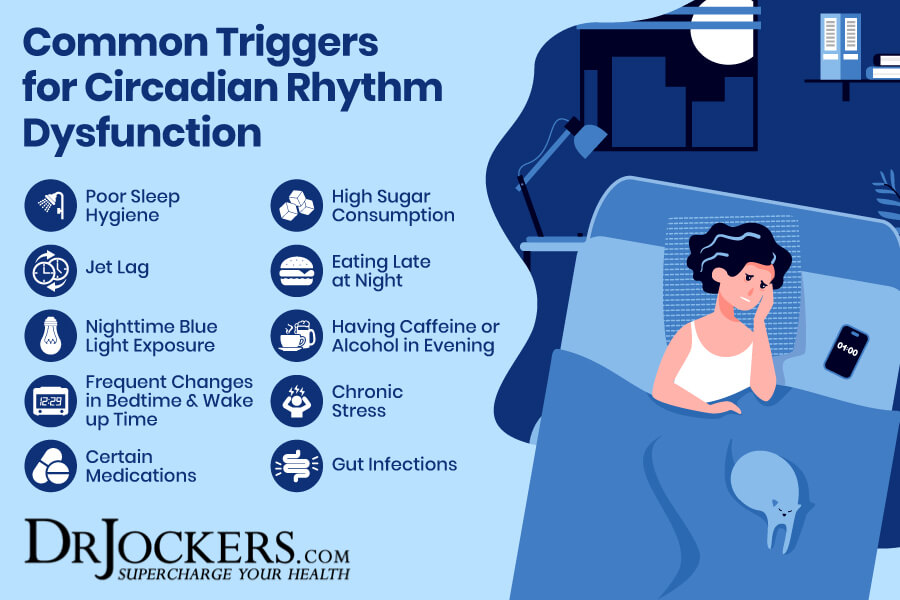
Top Strategies for Healthy Circadian Rhythm
Clearly, supporting a healthy circadian rhythm is critical for your physical and mental health. I recommend the following strategies for a healthy circadian rhythm.
Get Good Sun Exposure During the Day
Sunlight is a natural source of blue light. Natural blue light from the sun supports alertness, energy, reaction time, mood, and well-being during the day and helps you sleep at night. Sun exposure has other health benefits too, including improving your vitamin D levels.
I recommend getting sun exposure during the day. Spend as much time outdoors as you can. Keep your curtains open and rely on the sun instead of artificial light.
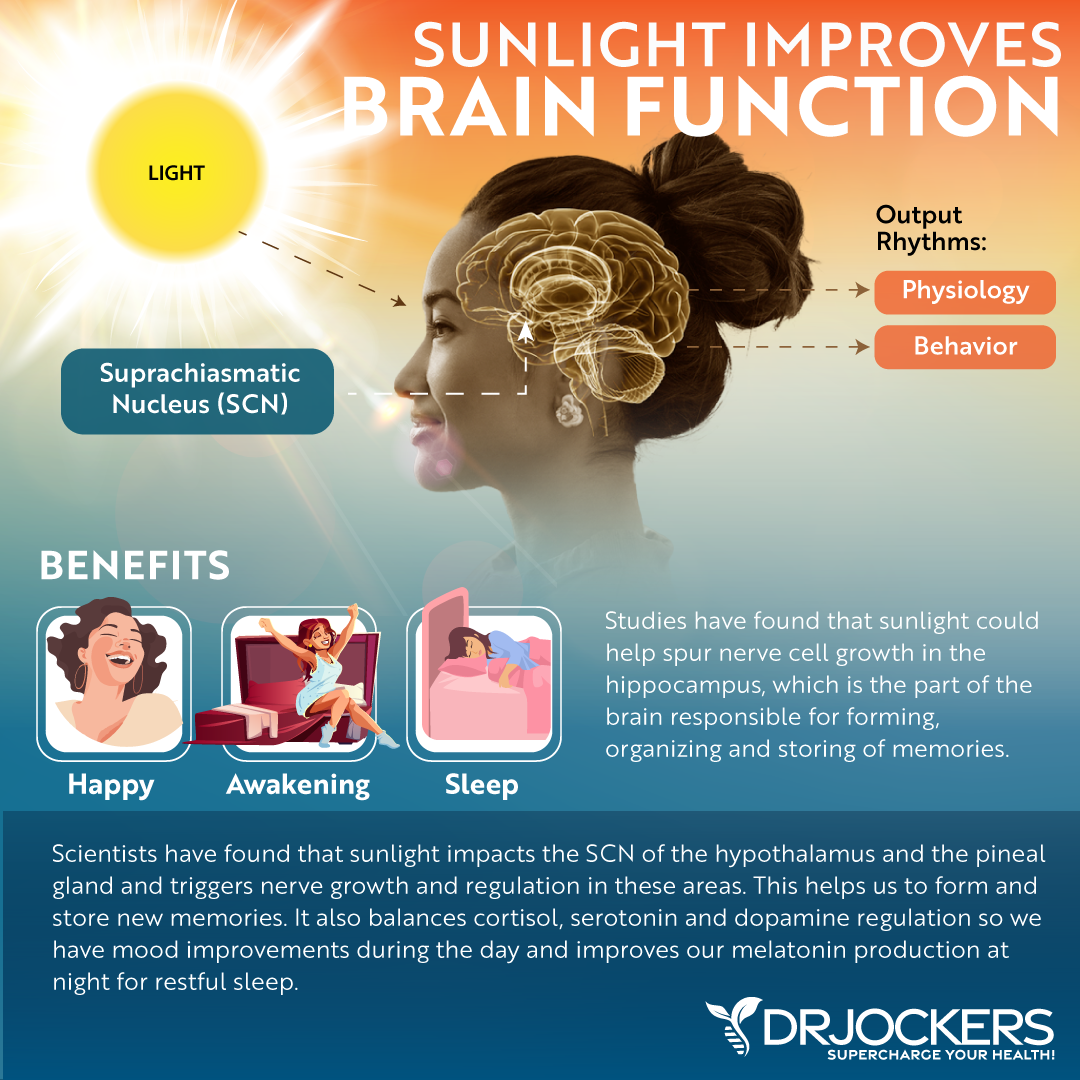
Reducing Blue Light Exposure at Night
Though natural blue light from sun exposure during the day is important, reducing blue light exposure in the evening and at night is just as critical. Reduce artificial blue light exposure at night.
Avoid LED and fluorescent lighting. Dim your lights. Avoid using electronic screens as much as possible, especially two hours before going to sleep.
Cut Down Your Screen Time
Reducing your screen time is the single best way to reduce your exposure to blue light from electronic devices. Reduce your screen time during the day as much as possible.
It’s understandable that you may need electronic devices for work and some important personal things, but avoid chatting all day or scrolling social media aimlessly. Eliminate screen time completely at least two hours before going to bed.
Use Eyeglasses with the Right Prescription
Looking at the screen all day is bad enough. But squinting and looking at the screen you can’t see well is even worse.
If you need to wear prescription glasses to correct your eyesight, especially for close, make sure that you wear your glasses whenever you are using your electronic devices.
Practice the 20/20/20 Strategy
Living without electronic devices is, unfortunately, impossible. However, there are several ways to reduce your risks.
Practicing the 20/20/20 strategy means that you stop using your computer or other electronic devices every 20 minutes and focus on an object about 20 feet away for at least 20 seconds before returning to the screen. This can give you a little break and may reduce eye strain.
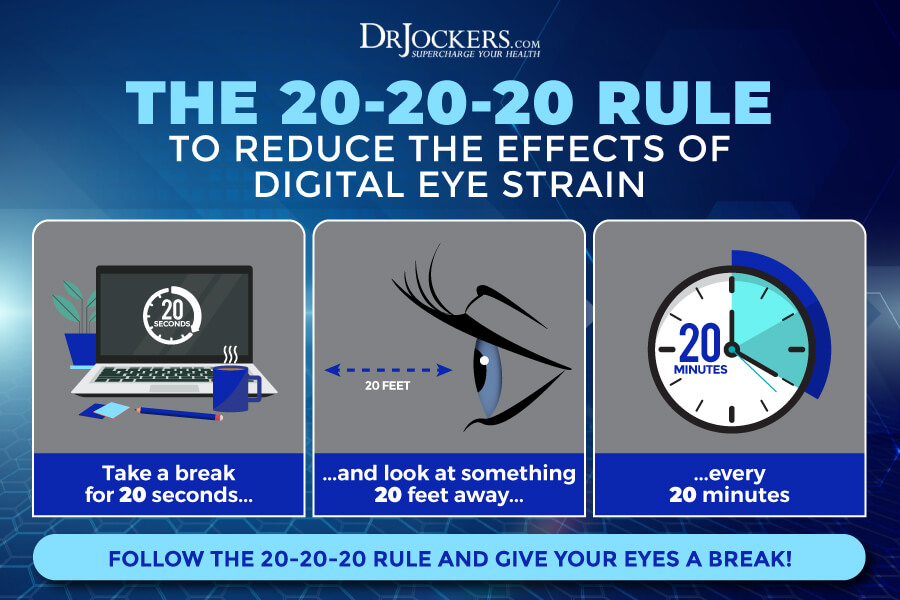
Keep Your Eyes Moist
Blue light exposure and staring at the screen may dry your eyes out. Try using a room humidifier to keep your eyes from becoming dry. You may also try eye drops if you are dealing with dry eyes.
Adjust the Blue Light on Your Screens
Another strategy you can try is changing the settings on your laptop and other devices to ‘night shift’ mode. This mode has warmer colors that may reduce the risk of eyestrain and may interfere with your circadian rhythm less.
Try a Screen Cover
You may try a screen cover for your laptop that helps to filter out blue light. It may help to reduce the risk of tired eyes and eye strain, especially if working longer hours on your computer or laptop.
Try Blue Light Blocking Glasses
Blue light blocking glasses may help to reduce the strain and risks from blue light exposure when using electronic devices. In the next sections, I will discuss the benefits of wearing blue light blocking glasses.
What are Blue Light Blocking Glasses
Blue light blocking glasses are non-prescription eyewear specifically designed to filter out and protect you from harmful artificial blue light emitted from digital screens. Though reducing your screen time is important, unfortunately, for most of us, it’s impossible to completely eliminate them.
Wearing blue light blocking glasses can help to reduce the negative effects of artificial blue light from digital screens. I recommend wearing them whenever you are using your computer, laptop, tablet, phone, or other digital blue light-emitting devices.
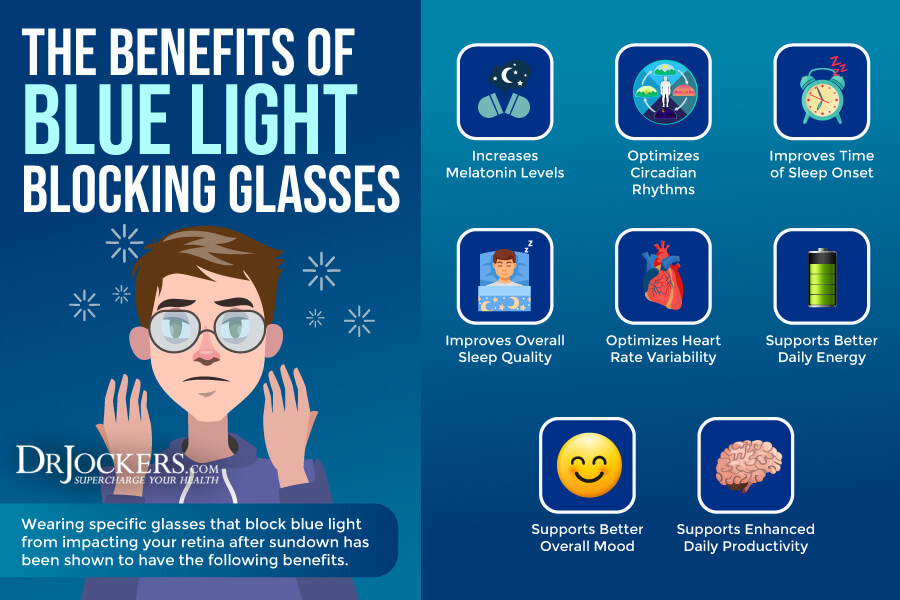
Benefits of Blue Light Blocking Glasses
The potential benefits of wearing blue light blocking glasses while using digital devices may include:
- Lower risk of eye strain, dry eyes, and other eye problems
- Fewer headaches and migraines related to digital device use
- Improved sleep
- Improved circadian rhythm
- Improve overall well-being
Studies on Sleep and Blue Light Blocking Glasses
Research is still limited on the benefits of blue light blocking glasses. However, several recent research studies have shown that blue light blocking glasses may support your circadian rhythm and sleep. A 2019 study published in the Journal of Psychiatric Research has found that wearing blue light blocking glasses two hours before bed may help to reduce insomnia and improve sleep (11).
According to a 2019 study in Chronobiology International, this may happen because blue light blocking glasses may reduce the suppression of melatonin (12). According to a 2021 study published in Applied Psychology, blue light blocking glasses helped to improve the sleep quality and quantity, as well as work performance, of participants (13).
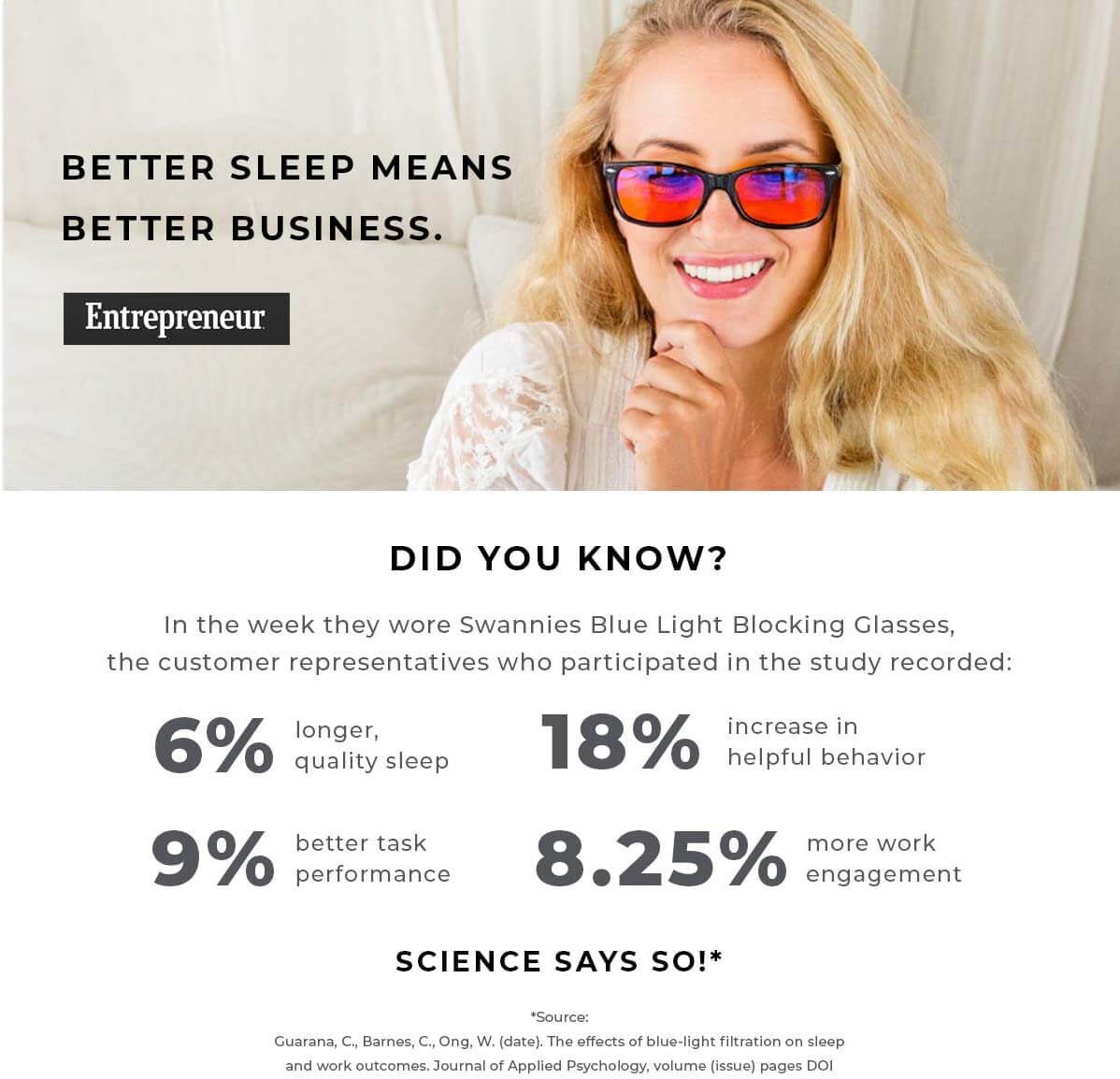
Studies Comparing Blue Light Blocking Glasses
Blue light blocking glasses may help to improve your sleep and reduce the risks of blue light exposure from screens. However, blue light blocking glasses are not created equal. The brand you buy absolutely matters.
According to a 2021 study at the University of Arizona, there are great differences between the effectiveness of blue light blocking glasses on the market (14). They found that these glasses differ in effectiveness at filtering out short wavelength light and in their ability to support the release of melatonin for supporting sleep.
Researchers tested 50 brands and found that 23 of them blocked less than 50 percent of sleep-disrupting blue light making them less effective. They also noted that comfort and wearability that allows reading, screen viewing, and other nighttime activities comfortably without creating a too dark experience were also important, beyond their blue light blocking qualities.
They found that the Swanwick Blue Light Blocking Glasses were the best when it comes to blue light blocking ability, wearability, and comfort. These particular blue light blocking glasses have been shown to block out 99% of the blue light they are exposed too. This is significantly better than any other blue light blocking glasses on the market.
The 2021 study published in Applied Psychology I talked about earlier used Swanwick for their study (13). They found that Swanwick blue light blocking glasses helped to improve the sleep quality and quantity, as well as work performance, of participants.
A 2016 study by SleepCore Labs has found that Night Swannies® by Swanwick helped to improve overall sleep, sleep duration, average daily sleep, sleep quality, ability to fall asleep quickly, ability to stay asleep, and the feeling of being rested in the morning (15).
Introducing Swanwick Blue Light Blocking Glasses
I recommend the Swanwick Blue Light Blocking Glasses. These glasses are highly comfortable and most importantly, they are tested and effective. They are laboratory-developed, orange-tinted glasses that are able to block blue light by over 99 percent.
This is much more than other blue light blocking glasses with only a mere yellow tint or yellow lenses ever can. They use BPA-free acetate frames, flexible spring hinges, prescription-grade CR-39 lenses, and calming orange-tilted lenses. They are comfortable to wear as much as you need to whenever you are using your devices.
Swanwick Blue Light Blocking Glasses may help to reduce eye strain, headaches, and other issues from blue light exposure from devices. They may increase alertness, cognition, memory, mood, and energy during the day. They may help you fall asleep quicker and stay asleep easier. They can help you to get better quality restorative sleep and to feel rested and energized when you wake up. Get yours today using this link to get 15% off purchases of $45 or more.
Final Thoughts
For most of human history, the only source of blue light was the sun. Today, we are exposed to artificial blue lights from TVs, computers, laptops, smartphones, tablets, and other electronic devices. Constant blue light exposure can impact your circadian rhythm, cause sleep issues, and disrupt your health. To reduce your blue light exposure, I recommend following the strategies outlined in this article and using Swanwick Blue Light Blocking Glasses. Use this link to get 15% off purchases of $45 or more.
You may notice improvements not only in your cognition, mental sharpness, mood, and energy but also in your overall health. If you want to work with a functional health coach, I recommend this article with tips on how to find a great coach. On our website, we offer long-distance functional health coaching programs. For further support with your health goals, just reach out and our fantastic coaches are here to support your journey.
Inflammation Crushing Ebundle
The Inflammation Crushing Ebundle is designed to help you improve your brain, liver, immune system and discover the healing strategies, foods and recipes to burn fat, reduce inflammation and Thrive in Life!
As a doctor of natural medicine, I have spent the past 20 years studying the best healing strategies and worked with hundreds of coaching clients, helping them overcome chronic health conditions and optimize their overall health.
In our Inflammation Crushing Ebundle, I have put together my very best strategies to reduce inflammation and optimize your healing potential. Take a look at what you will get inside these valuable guides below!
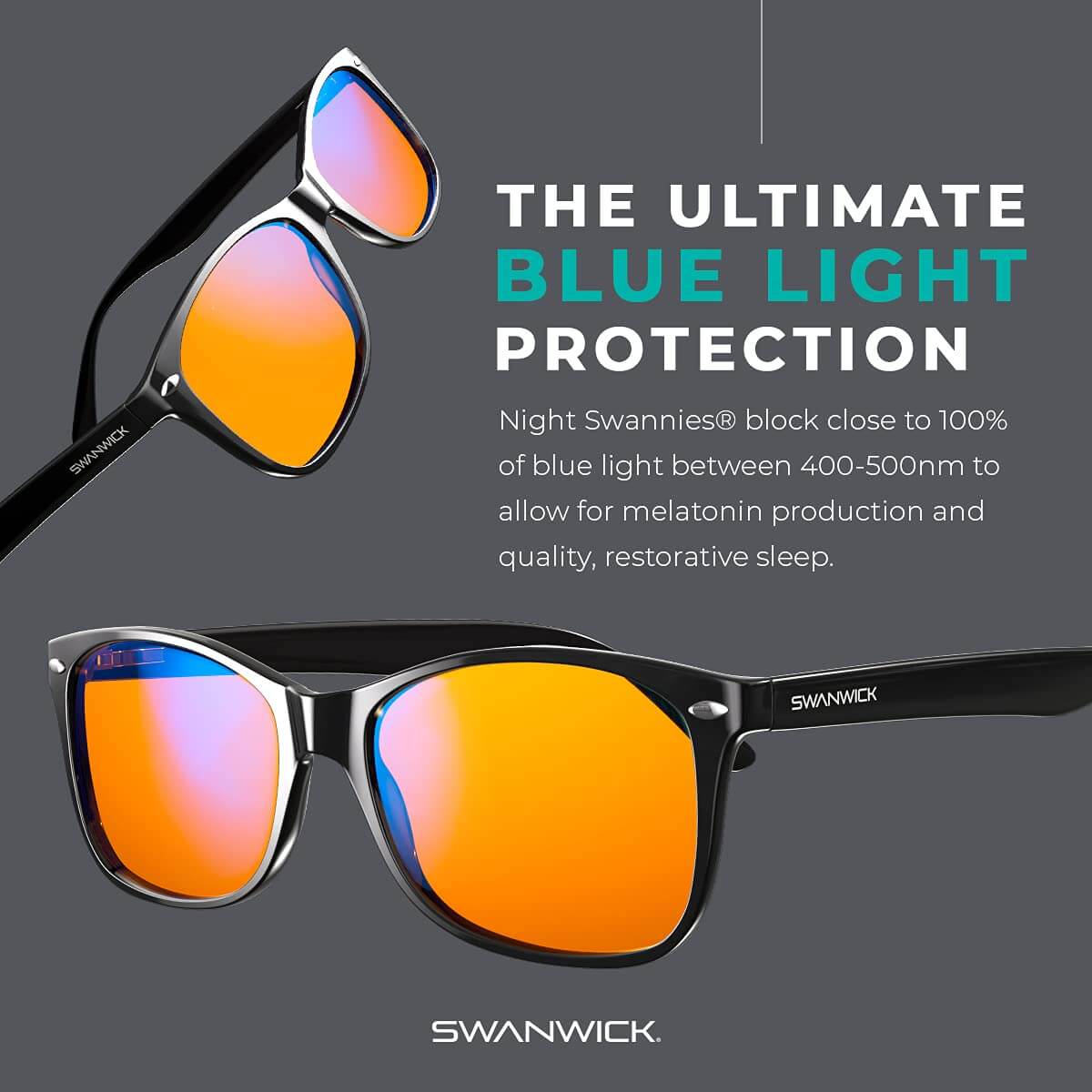
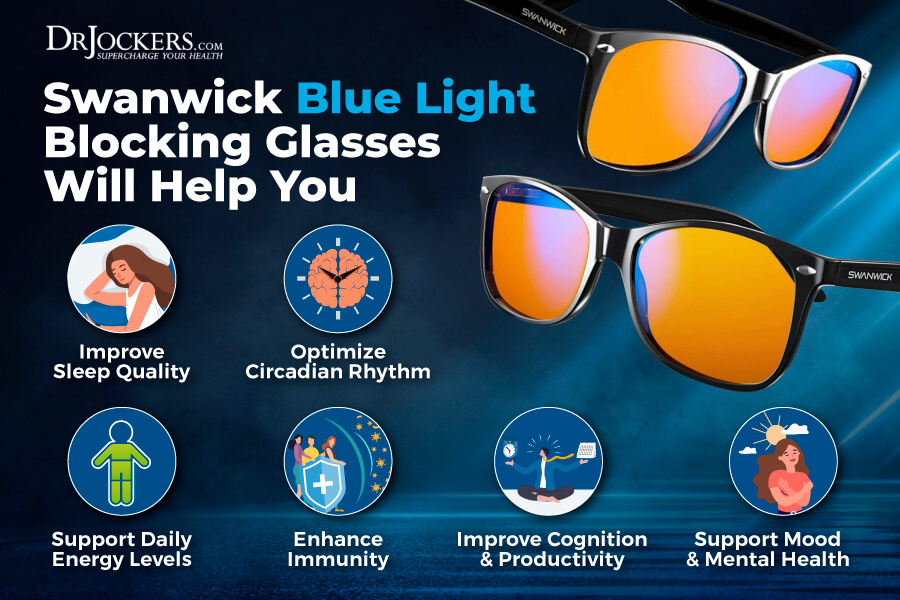




Macular degeneration maybe caused by gluten/low Zn/low Lutein/low taurine etc.. Blue blocking glasses surprised my mom who has macular degeneration being more bright which may have helped her see better. Quercetin may help Zn get into cells. Red Light therapy may help the retina mitochondria.
Thanks for sharing!